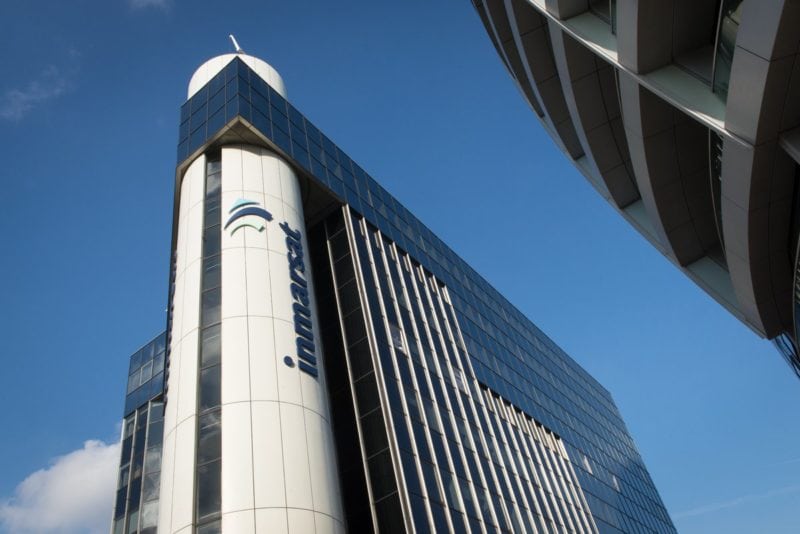Going Private May Strengthen Inmarsat, Analysts Say

Inmarsat’s London Headquarters. Photo: Inmarsat
Shareholders of London-based satellite operator Inmarsat decided in mid-May that the company will be sold to Triton Bidco, a newly formed private consortium. Satellite industry analysts believe going private could provide Inmarsat’s management with more flexibility to navigate an upcoming period of disruption and changing business models.
“To be private in this period in time could bring more flexibility and fewer obligations to communicate and disclose operations especially when it comes to possible acquisitions, changing strategies and further investment,” said Pacôme Révillon, CEO of Paris, France-headquartered, space industry consulting firm Euroconsult.
According to Susan Bull, senior consultant at London-based Comsys, Inmarsat, which has invested heavily over the past years into its Global Xpress fleet of high-throughput Ka-band Geostationary Orbit (GEO) satellites, might find it difficult to push through further investment as a public company while still waiting for returns from the previous investment cycle to fully materialize.
“Inmarsat seems to be looking to become a dominant player in the aeronautical market,” said Bull. “Historically, they have been in the maritime market and this is one of the big changes that they seem to be on track of making. With such radical changes, they could see their investors having a problem and possibly running away from them, which would send the share price down at a time when they need to be investing.”
While Inmarsat’s board rejected an earlier bid by U.S. satellite operator EchoStar, it has now put the $3.4 billion take-over offer from Triton Bidco, a consortium of private equity funds including Apax Partners, Warburg Pincus International, and Canada Pension Plan Investment Board, in front of its shareholders. Apax was part of a consortium that owned Inmarsat between 2003 and 2005, suggesting close links between the two entities. The consortium is offering $7.21 in cash per Inmarsat share. The sale, if approved by the company’s shareholders, will be completed by the end of this year. The companies don’t expect to encounter regulatory hurdles.
Bull said that while the satcom industry might be entering a period of consolidation, the proposed sale of Inmarsat doesn’t seem to fit the expected pattern. “We might start seeing more mergers,” Bull said. “We might, for example, start seeing telcos acquiring satellite companies. But in the case of Inmarsat, that’s just a financial change.”
In the intention announcement, Triton Bidco expressed confidence in Inmarsat’s existing strategy and growth trajectory, suggesting the firm doesn’t intend to make radical changes to Inmarsat’s operations. The company also said Inmarsat’s headquarters will remain in the U.K.
Inmarsat’s largest shareholder Lansdowne Partners, which owns 11.4 percent of the company, had signaled they would support the deal. A source familiar with the situation inside Inmarsat described the atmosphere inside the company as largely positive, mostly due to the pre-existing relationship with APAX. The company reported in March that its revenue grew in 2018 by nearly 6 percent, driven mostly by the growth of its aviation division.
Révillon said that while in the past three to four years, private equity firms have shown interest in satellite service companies, Inmarsat, is the first case of a company vertically integrated between infrastructure and services that is being targeted.
“Usually, private equity funds come into sectors where there is potential for companies to grow and opportunities to contribute to a general restructuring and a period of change in the given industry,” he said. “It would be quite interesting to see whether this will be a one time opportunity or whether in the near future in the current dynamic environment it could represent the first event that will trigger some additional movement in the industry.”
Bull said that while the sale of Inmarsat might be the beginning of a wave of consolidation, the recently announced acquisition of Very Small Aperture Terminal (VSAT) maker Newtec by Singapore Technologies Engineering is not part of the same developments.
“I don’t necessarily expect more such developments on the VSAT side of things,” Bull said. “There are few possible times when that might happen but on the general basis, the market is not huge and we do not have a huge number of manufacturers out there so I don’t really see a massive amount of consolidation happening.”
Bull believes that customers might benefit from the Newtec acquisition since Singapore Technologies Engineering already owns Newtec’s competitor iDirect.
“I think we might expect some real technology advances as a result of this transaction,” said Bull. “Both Newtec and iDirect have real strengths but they also have some weaknesses. Combining the two might result in some really interesting systems that could really meet customers’ needs on a very high level.”